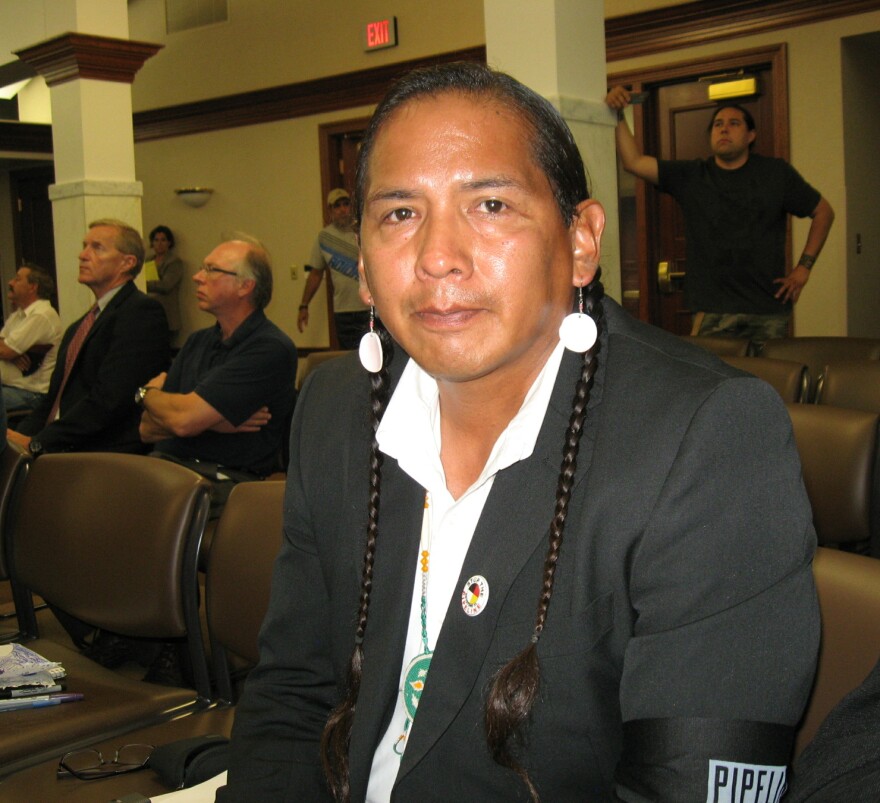On Monday evening, public utilities commissioners heard from more than 50 opponents and supporters of the Keystone XL pipeline. This gathering, held in advance of a longer hearing set for the end of the month, gave citizens an opportunity to offer up their opinions on the project even though they’re not official interveners. It also gave opponents an opportunity to address two topics that have been deemed irrelevant to the end-of-month hearing—climate change and tribal treaty rights.
Dana Loseke of Sioux Falls chairs the South Dakota Sierra Club. He says TransCanada assures the safety of its product—tar sands crude—but doesn’t acknowledge that burning that product leads to atmospheric damage, increasing acidity of oceans, and the devastation of forests because of shorter and warmer winters that give mountain pine beetles a stronger foothold.
“They take no responsibility for the fact that the frequent…and catastrophic weather events that NASA has predicted years ago are occurring more and more frequently, which costs taxpayers in South Dakota and the United States billions of dollars,” he said.
Loseke and other environmentalists asked commissioners to use their authority to protect the environment.
Some tribal members appealed to the PUC to read the federal law stemming from the Fort Laramie Treaty of 1868, which granted tribes of the Great Sioux Nation the land west of the Missouri River in South Dakota, as well as access to other land.
Gary Dorr of Winner was one of many indigenous people who asked the PUC to consider treaty rights. Dorr says that just because the pipeline isn’t slated to cross current reservation boundaries doesn’t mean it can legally cut through Western South Dakota.
“We’re not talking about Indian Country. We’ve never said that,” he says. “The treaty rights apply to the reservation and to the territory described in the treaty.”
Dorr says the proposed pipeline crosses treaty territory, and under federal law, treaty rights carry with the land forever.
Pipeline proponents didn’t specifically address climate change and treaty rights, but spoke of economic benefits to laborers, local governments, and taxpayers. They say Canadian oil will decrease the United States’ dependence on Middle Eastern oil.
The Monday night hearing is part of the permitting process allowing the Keystone XL pipeline to cross western South Dakota. Parent company TransCanada has to certify that it can still meet conditions set four years ago when the PUC initially approved the pipeline for construction.
Commission chairman Chris Nelson says the testimony taken at the hearing is not part of the evidentiary record. Parties have already filed legal evidence, with copies available online at the PUC website, and the evidentiary process will continue with a seven-day hearing starting July 27.
Nelson says the Monday evening gathering allowed commissioners to hear comments that will assist them in formulating questions to ask at the end-of-month hearing. Nelson explains the decision to disallow testimony on climate change and treaty rights at the next hearing.
“Keystone filed motions with us making their case that… in the case of the treaty rights issue, were beyond the jurisdiction of this public utilities commission, and in the case of climate change, was not applicable to the question that we ultimately have to answer, and that is, ‘Can the company still comply with the conditions of the permit that were issued back in 2010?’” Nelson says.
At the Monday night hearing, each speaker was allowed five minutes to speak, without being subjected to cross examination.
The PUC will hear from attorneys and witnesses in a legal hearing set for the week of July 27 and August 3-4.



